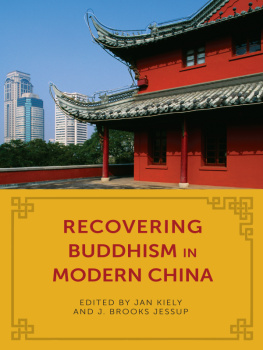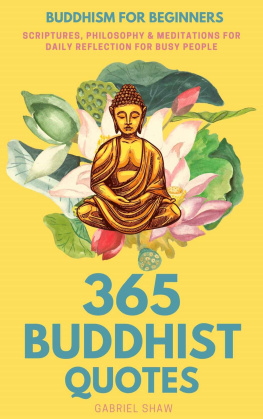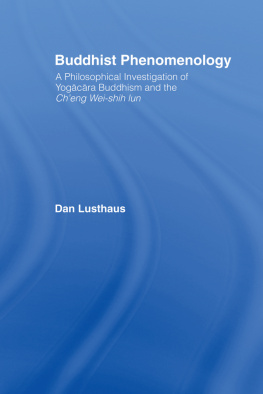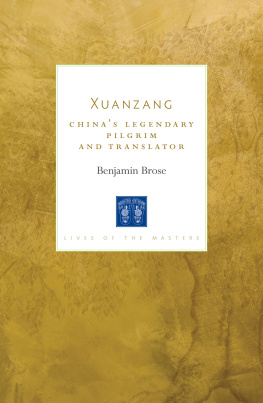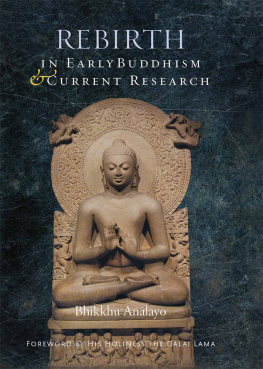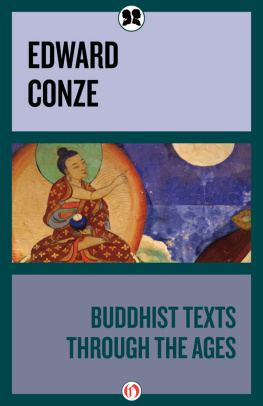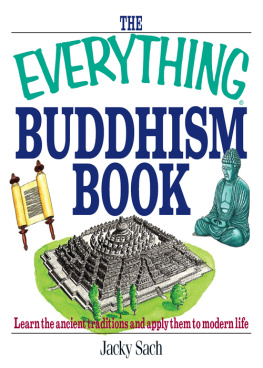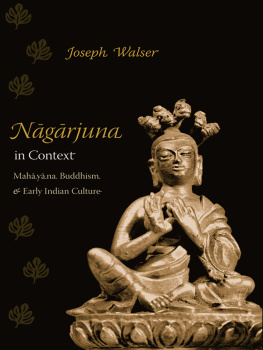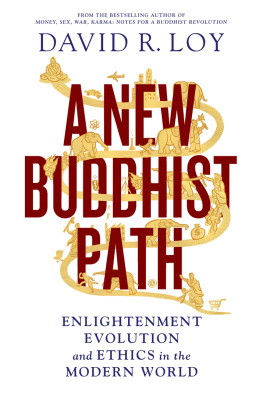RECOVERING BUDDHISM IN MODERN CHINA
THE SHENG YEN SERIES IN CHINESE BUDDHIST STUDIES
THE SHENG YEN SERIES IN CHINESE BUDDHIST STUDIES
Chn-fang Y, series editor
Following the endowment of the Sheng Yen Professorship in Chinese Buddhist Studies, the Sheng Yen Education Foundation and the Chung Hua Institute of Buddhist Studies in Taiwan jointly endowed a publication series, the Sheng Yen Series in Chinese Studies, at Columbia University Press. Its purpose is to publish monographs containing new scholarship and English translations of classical texts in Chinese Buddhism.
Scholars of Chinese Buddhism have traditionally approached the subject through philology, philosophy, and history. In recent decades, however, they have increasingly adopted an interdisciplinary approach, drawing on anthropology, archaeology, art history, religious studies, and gender studies, among other disciplines. This series aims to provide a home for such pioneering studies in the field of Chinese Buddhism.
Michael J. Walsh, Sacred Economies: Buddhist Business and Religiosity in Medieval China
Koichi Shinohara, Spells, Images, and Maalas: Tracing the Evolution of Esoteric Buddhist Rituals
Beverley Foulks McGuire, Living Karma: The Religious Practices of Ouyi Zhixu (15991655)
Paul Copp, The Body Incantatory: Spells and the Ritual Imagination in Medieval Chinese Buddhism
N. Harry Rothschild, Emperor Wu Zhao and Her Pantheon of Devis, Divinities, and Dynastic Mothers
Erik J. Hammerstrom, The Science of Chinese Buddhism: Early Twentieth-Century Engagements
Jiang Wu and Lucille Chia, editors, Spreading Buddhas Word in East Asia: The Formation and Transformation of the Chinese Buddhist Canon
RECOVERING BUDDHISM IN MODERN CHINA
EDITED BY
JAN KIELY &
J. BROOKS JESSUP
COLUMBIA UNIVERSITY PRESS
New York
Columbia University Press
Publishers Since 1893
New York Chichester, West Sussex
cup.columbia.edu
Copyright 2016 Columbia University Press
All rights reserved
E-ISBN 978-0-231-54110-7
Library of Congress Cataloging-in-Publication Data
Recovering Buddhism in modern China / edited by Jan Kiely and J. Brooks Jessup.
pages cm. (The Sheng Yen series in Chinese Buddhist studies)
Includes bibliographical references and index.
ISBN 978-0-231-17276-9 (cloth : alk. paper) ISBN 978-0-231-54110-7 (electronic)
1. BuddhismChinaHistory20th century. I. Kiely, Jan, 1965- editor.
BQ645.R43 2016
294.30951'0904dc23
2015014709
A Columbia University Press E-book.
CUP would be pleased to hear about your reading experience with this e-book at .
COVER IMAGE
Getty / DEA / W. BUSS / Contributor
COVER DESIGN
Jordan Wannemacher
References to websites (URLs) were accurate at the time of writing. Neither the author nor Columbia University Press is responsible for URLs that may have expired or changed since the manuscript was prepared.
CONTENTS
JAN KIELY AND J. BROOKS JESSUP
J. BROOKS JESSUP
ERIK J. HAMMERSTROM
GREGORY ADAM SCOTT
BENJAMIN BROSE
XUE YU
JAN KIELY
GARETH FISHER
NEKY TAK-CHING CHEUNG
W e are grateful for the grant funding from the Chinese University of Hong Kong (CUHK) and support from the Centre for East Asian Studies (renamed Centre for China Studies in November 2012) that made possible the workshop held at CUHK in May 2012 from which this book originated. We would like to thank all who participated and made important contributions to the workshop as either presenters or commentators, particularly David Faure, Amy Holmes-Tagchungdarpa, Rongdao Lai, Andr Lalibert, Rebecca Nedostup, Brian Nichols, David Palmer, and Erik Schicketanz. We are thankful also to the wonderful staff and graduate students of the Centre for East Asian Studies for their logistical support during the workshop, above all the principal event coordinator, Esther Yip. We would like to thank as well Vincent Goossaert, Paul Katz, John Lagerwey, and Izumi Nakayama for their helpful advice and suggestions as we worked on the manuscript. And we are grateful to our teachers, Frederic Wakeman Jr. and Wen-hsin Yeh, for supporting our initial interest in Chinese Buddhists in the modern period. Finally, we wish to express our heartfelt gratitude to the Columbia University Press series editor Chn-fang Y, to the anonymous manuscript reviewers for their valuable comments, and to editors Christine Dunbar and Wendy Lochner and the copyeditor, Mike Ashby, for their tireless efforts and support in seeing this volume to completion.

JAN KIELY AND J. BROOKS JESSUP
Although the new Republic born in 1912 did not, finally, establish a state religion, Buddhism and Buddhists in a diverse array of forms nevertheless played important and dynamic roles in the modern transformations of Chinas twentieth century and continue to do so in the present day.
Historical scholarship has until recently paid little attention to the Buddhist presence in the social, cultural, and political arenas of modern China. The tendency is not specific to Buddhism but rather symptomatic of a general marginalization of Chinese religion by historians of the modern period that has remained remarkably persistent across successive generations of scholarship. Whether the perspective has been Western impact or China centered, modernization or revolution, civil society or hegemonic state, political ideology or everyday life, social structures or discursive shifts, most research has tended to presume a predominantly secular Chinese modernity. Such consistent marginalization of religion in the agenda for the historical study of twentieth-century China stands in particularly striking contrast to the high priority it has long held among scholars of imperial China, as well as in scholarship on other parts of Asia in the modern period. One reason for this exceptional undercurrent of historiographical secularism is undoubtedly the ideological atheism of the Communist movement that claimed victory in 1949 and the antireligious violence it unleashed less than a generation later in the Cultural Revolution. Moreover, the assault on Chinas religious heritage in the second half of the twentieth century was in many ways a culmination of, rather than a departure from, earlier manifestations of modern secularism in the first half of the century, such as the late Qing New Policy movement to convert temples into schools, the May Fourth rejection of divine authority, and the Nationalist state campaigns against superstition. In other words, historiographical secularism in scholarly research has derived its longevity in part from the apparent triumph of an empirical secularism in portions of the historical record emphasized by certain narratives influential among both Chinese and Western scholars.
By bringing to light such religious phenomena as sprawling redemptive societies, urban self-cultivation markets, and refashioned temple festivals, this scholarship has begun to map out a vast and shifting religious landscape in the modern period that went virtually unrecognized until quite recently.
The legacy of these Republican-era Buddhist adaptations and innovations is particularly prominent in the international Buddhist organizations of contemporary Taiwan, which have been the subject of much recent research. Nevertheless, much work remains to be done throughout this burgeoning yet still nascent field of study, particularly in exploring underresearched periods such as the War of Resistance through the Mao era; social groups, including women and non-Han minorities; and geographic areas beyond the urban centers of China proper. Future research should also shed light on connections and comparisons with non-Buddhist religious traditions in China, as well as with the global Buddhist modernisms of other parts of the world and in overseas Sinophone communities.

